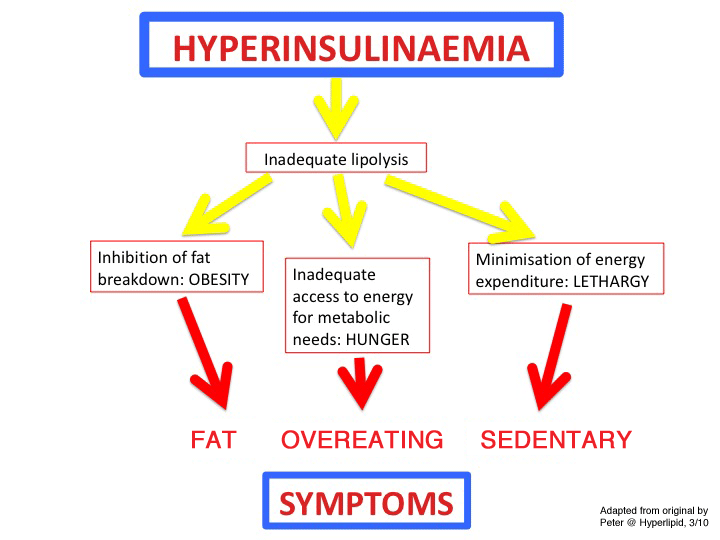The insulin hormone is produced by the pancreas. It is involved in several functions including letting your cells absorb the sugar from the blood and convert it to energy. But, an excessive amount of insulin can cause serious problems.
If you have high levels of insulin in your body then the condition is known as hyperinsulinemia. This is related to obesity, cancer and heart disease. It can also cause the cells to develop resistance against the effect of the hormone.
Symptoms of excess Insulin
Although there are no clear indicators for hyperinsulinemia in the beginning but when the blood glucose levels spike then you might see the below symptoms:
- Weight gain
- Feeling extremely hungry
- Craving for sugar
- Difficulty in concentrating
- Anxious
- Panic
- Lack of focus
- Fatigue
- Increase in blood pressure
- Increase in cholesterol levels
If you notice a combination of the above symptoms then you should contact a doctor.
Risks of excess insulin
There are a number of risks that are involved when the pancreas produces excess insulin in the body. These include:
- Increase in triglyceride levels
- High uric acid level
- Hardening of the arteries
- Weight gain
- Hypertension
- Type 2 diabetes
The sooner you are able to identify the increase in your insulin levels then sooner you can control the insulin levels in your body.
When your body develops insulin resistance, the pancreas produces more insulin than usual. Several things can help you to lower down the insulin levels in your body.
- Follow a low-carb diet
Carbs increase the blood sugar and insulin levels in the body. So, having a low-carb diet can help to control diabetes and reduce weight. According to many studies, a low-carb diet can help in reducing insulin levels and increasing insulin sensitivity.
People with health conditions like metabolic syndrome or polycystic ovary syndrome (PCOS) may experience a drastic reduction in insulin levels by restricting the carb intake.
In one of the studies, people with metabolic syndrome ate a low-fat or low-carb diet. They saw a 50% decrease in the insulin levels in the group that took a low-carb diet and 19% in the group that had a low-fat diet.
In another study, women with the condition of PCOS ate a low-carb diet and they notice a great decrease in insulin levels compared to the ones that ate a high-carb diet.
- Have apple cider vinegar
Apple cider vinegar helps to control the increase in insulin levels and blood glucose levels. It is often effective when taken with high-carb food items.
One of the studies showed that people who took 2 tablespoons of vinegar along with a high-carb meal noticed low insulin levels and felt full after 30 minutes of having the meal. According to the researchers, the vinegar slows down the process of emptying the stomach so there is gradual absorption of sugar in the blood.
- Eat a proper portion size
If you eat a lot of food in one go then it can cause hyperinsulinemia. Though the pancreas produces different amounts of insulin depending on the type of food you eat, it is not advisable to over-eat.
This is a major concern in people with obesity. In one study, people with obesity consumed 1300 calorie meals showed twice the increase in insulin levels compared to lean people who had the same meal.
Intaking fewer calories helps to increase insulin sensitivity and decrease insulin levels in people with overweight. In one study, researchers found that 16% of insulin levels were decreased in people who followed calorie restriction and a 12% reduction in people who opted for the portion control method.
- Avoid any form of sugar
You should avoid taking sugar in any form if you are trying to bring down your insulin levels.
In one study a group of people overate candies and another group overate peanuts. Researchers found that there was a 31% increase in fasting insulin levels in the candy group and a 12% increase in the peanuts group.
You will find Fructose in sugar, honey, high-fructose corn syrup, and agave. You should avoid consuming them in large quantities or it spikes your insulin levels.
In another study, when overweight people ate high-sugar food items, there was a 22% increase in insulin levels but when they added artificially sweetened sugar then there was a 3% decrease in insulin levels.
- Exercise regularly
You should follow a proper exercise routine daily as it will help in controlling the insulin levels. Aerobics is effective in controlling the insulin levels in people with obesity or who have type 2 diabetes.
In a study, two groups were compared who followed different exercises. One group performed sustained aerobics and another performed high-intensity interval training. Both groups showed improvement in fitness but the one that did sustained aerobics experienced a significant decrease in insulin levels.
Combining aerobics and resistance exercise is very effective for controlling the insulin levels.
- Add cinnamon in your diet
Cinnamon has health-promoting antioxidants. Studies showed that taking cinnamon helps to increase insulin sensitivity and lowers insulin levels.
In one study, people who had cinnamon in rice pudding showed lower insulin responses than the ones who did not include cinnamon. In another study, young men who had high-sugar drinks after having cinnamon showed lower insulin levels compared to the ones who had the same drink after taking placebos.
But all studies do not show the same results. The effect of cinnamon varies from person to person.
- Avoid refined carbs
For many people refined carbs are the major food. There are many studies that showed consuming them daily can cause health problems like an increase in levels of insulin and weight gain.
Refined carbs have a high glycemic index. Glycemic index (GI) is the capacity of the food to raise blood sugar. Different foods have different GI. Several studies were performed on different food items. When people eat high-glycemic food then your blood glucose levels increase more compared to having the same portion of low-glycemic food even though the carb content in both of them was the same.
- Avoid Sedentary Behaviour
You should live an active life to keep our insulin levels in control. One study showed that people who had sedentary behavior were twice likely to have metabolic syndrome than the ones who did a moderate amount of activity.
Other studies show that standing up and walking around rather than sitting for long hours can help in controlling the insulin levels after having a meal.
A 12-weeks study showed that middle-aged sedentary women who walked for 20 minutes after a meal showed a reduction in insulin level compared to the women who did not walk after a meal.
- Try Intermittent Fasting
Intermittent fasting has become famous for weight loss. According to researchers, it helps to lower insulin levels along with weight.
One of the studies showed that obese women lose weight and experienced an improvement in health when followed intermittent fasting with liquid or solid meals. But, only a liquid diet shows significant results in reducing insulin levels.
Alternate-day fasting is also effective for lowering down the blood glucose. In this you reduce calories one day and you eat normally the other day.
Though intermittent fasting is beneficial to many people, it does not work for everyone and can also cause a problem in some people.
- Increase the intake of Soluble Fiber
Soluble fiber helps in losing weight and reducing blood glucose levels. It absorbs the waters and forms a gel. This slows down the movement of food through the digestive tract. This makes you feel full and restricts your body from increasing the insulin levels after the meal.
It also helps to feed the friendly bacteria in the colon. This may improve the health of the gut and reduces insulin levels.
Fibers that you get from the whole food are more effective in lowering the insulin levels than the ones available in the supplement form.
According to one study, the combination of whole food and supplement fiber helps to lower insulin levels the most.
- Get rid of the belly fat
Belly fat can cause many health problems. It is also known as the visceral or abdominal fat. If you have too much fat around your abdomen then it can cause inflammation and hyperinsulinemia.
Studies showed that decreasing your belly fat helps to increase insulin sensitivity and reduces insulin levels.
People who have high insulin levels find it difficult to get rid of the belly weight. Even if they manage to lose weight, they will also regain it later.
- Drink Green tea
Green tea is healthy as it contains antioxidants known as epigallocatechin gallate.
Some of the studies showed that people who consumed green tea for 12 months had a small decrease in their insulin levels compared to the ones who took a placebo.
- Eat Fatty Fish
Fatty fishes like salmon, mackerel, sardines, herring, and anchovies provide high-quality protein and are the best sources of omega-3 fat.
Studies have shown that they help in reducing insulin resistance in people with obesity, PCOS and gestational diabetes.
A study in women with the condition of PCOS showed an 8.4% decrease in blood glucose when they included fish oil in the diet.
- Take the right protein in the right quantity
Consuming proper protein in proper amounts can help in reducing the insulin levels. Proteins stimulate insulin production so the muscles can take up the amino acids. So, if you eat it in high quantities then it can cause high insulin levels.
According to a study, older obese women had lower insulin levels after having a high-protein breakfast compared to the one who had a low-protein breakfast.
Another study showed that having dairy protein raises insulin levels so one should try to avoid it or consume it in less amounts.





